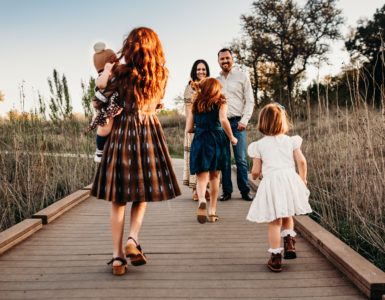When you or your family decide to adopt, one of the first steps is to decide what your parameters are for adoption. Deciding what age range you are interested in pursuing is an important beginning decision and can impact the entire adoption process from here on out. Many families decide to pursue infant adoption. They want to experience parenthood from birth. Then, there are others who, for a variety of reasons (that can include country limitations, personal reasons, or specific rules about the children already in your home) pursue the adoption of a younger child. A toddler or younger elementary-aged child is often heavily pursued when a family chooses international adoption.
Then there are the parents that are ready to encounter big and fierce giants, fighting through the messiest battles to help bring their child into a safe and loving home. Those adoptive parents pursue adopting older children–children that have been left behind time and time again. The risk is big, but the reward can be even bigger. Here are five reasons to consider adopting older children.
1. The need is big.
While the need for supporting orphan care and bringing children into safe and loving homes is so important in every facet, there is an equally pressing need in the special needs, sibling, and older-child realm of the adoption world for the building of forever families. The older children are there because, unless they were brought into the program at an older age, have been passed through foster homes over again and again. The kids who are deemed “older” are often ignored, while the younger children are getting chosen. Those older children, who have life in their eyes and have most likely experienced things that you would never want to dream of, can be considered scary or too dangerous by many adoptive parents. And, while adopting older children may not be a safe choice for your family depending on the family dynamic in your home or your experience level with trauma, that may just be a safeguard you are putting up because it looks scary on the outside.
But, with the proper support and training, maybe your family can consider adopting an older child and open up your home to potentially one of the most vulnerable groups of individuals. If you feel your heart being pulled to an older child, one who is a teen, preteen or upper elementary-aged child, listen to that pull. Why do you feel particularly drawn to them? Could you and your family consider bringing them into your family? Could you find a supportive inner circle that you could lean on while you are down in the trenches? Could you be a possible catalyst for a child, that would completely turn their life of brokenness into one of healing?
2. You can (most likely) avoid potty training!
While some families do want to experience the baby-stage of parenting: the late-night wake-up calls, the diaper changes, the coos, the first steps; potty training is often not something that even those baby enthusiasts look forward to. When you adopt an older child, unless that child has significant medical or psychological needs, you may be able to miss the potty-training stage altogether. Without diapers in the picture, that is one less battle to face. Adopting older children, though, can come with other unique challenges such as food hoarding, smoking, or inappropriate internet use–but at least they can take themselves to the bathroom. For adoptive parents who have adopted toddlers, this is often the most difficult trial once they have been home for a few months.
Due to trauma, this milestone can often take months, maybe even years, until a child is officially considered completely potty trained, and able to use the bathroom independently. So, if you consider yourself one of those prospective parents that would not mind missing the baby and toddler stages and celebrate the thought of not having to get enough candy to supplement all the bribes to use the toilet, then maybe you should seriously consider adopting a child that is old enough to have already conquered that stage of life.
3. Older children are more active in the adoption process.
When prospective parents go to adopt a younger child, typically under 12-14 years old, that child does not have any part in their own adoption process. They are simply at the whim of the government and their future parents. They may not even understand what is going on at all. But, when you adopt an older child, he or she is an active part of the adoption process. If you adopt internationally, the older children are sometimes required to submit a letter in writing (or verbal approval) of their adoption to the specific prospective parents pursuing them to the non-governmental agency facilitating the adoption. If they are an older child from foster care in the United States, they must consent to the adoption in court. (These approvals from the child(ren) become unrequired if the child is deemed unable to mentally consent). This means that the child gets to learn about you, meet you, study you and your family, and then determine if they want to join your family.
This can often give the adopted child a sense of control and ownership in their own lives, one of which they may have never experienced before. This control can empower them to want to be in a family and pursue learning how a family works and functions with a more open mind. This can also be a great experience for adoptive parents to connect with their future children. You can ask what they are excited about, and what they are concerned about. Try to build up a relationship early on as they weigh if you are a good fit for their life.
Now, sometimes children (obviously) need guidance, and hopefully, your non-governmental organization (NGO) will help your child discern if your family is a good fit for them with a clear and logical mind. Hopefully, though, you can create a sense of trust early on that they connect with and find grounding. These children may have never been able to trust anyone before; perhaps everyone they have ever known has left them at some point. So, you are fighting an uphill battle of trust built by people before you who you have never met. But, if you are strong enough to climb the hill, the view may just take your breath away.
4. There are often more grants available.
The financial aspect of adoption is a valid concern for many prospective parents. It is not always cut and dry whether it is affordable. Prospective adoptive parents often need to come up with creative ways to pay their way to their forever families. Unless their child is “legally free” in their own country, and therefore comes with a very little cost associated with the adoption process, the adoption of the child(ren) may be extremely expensive.
When adopting internationally, adoption costs can range anywhere from $15,000 to $60,000 with a plethora of factors determining your final cost. And, while parents need to remember they are not purchasing their child by any means, they do need to remember that you are paying for a variety of services along the way. From the home study requirements (which can include multiple screenings, medical appointments, and copays, buying a fire extinguisher, etc.), immigration paperwork, your dossier and translation, and your final visa and flights. The costs can pile up quickly.
But, one typical aspect of older child adoption that we have seen across the board is that these fees and the length of time it takes to accomplish these steps is often lessened significantly once you begin pursuing the adoption of an older child. The fees are often less due to the fact that there are often many “older child” grants available to prospective parents in that situation. People from afar, oftentimes, come and rally behind these older children long before a family begins their journey to them (like at Reece’s Rainbow). Donations are collected, photos are shared, and grants are established all in the hopes of having the future parents of these older children see them, and not be overwhelmed at the cost it may take to get them home.
Whether domestic or international, adoption processes are often shortened to expedite the time it takes to bring home older children. These children may be old enough to be aging out of the system which complicates the process. So, speeding up things like visa arrival with the embassy, dossier translation, or court times is imperative to make sure these children don’t lose out on precious family experiences due to timing. Adopting older children can have significant benefits in terms of cost and speed. That can be a strong factor for those parents who are looking to add to their family quickly, and who may be able to care for a child but do not necessarily have thousands of dollars sitting unclaimed in a bank.
5. Adopting older children gives you the unique ability to be able to instantly share your passions, hobbies, activities, and everyday life with your child.
When parents have biological children from birth or adopt younger children, they will spend the majority of their time doing what they want to do when they want to do it. You are fostering independence, and watching a child’s dreams and passions blossom before your eyes. But, when you adopt an older child, he or she will most likely have already done that. These children have already learned some form of independence (sometimes, at that point, in ways that you wouldn’t wish they would have experienced). They have already found a few things they may enjoy, and are now looking for new experiences. They are older and that makes it easier to share your passions and enjoyments with them.
When you adopt older children, you are able to do more things together, as two people independently doing an activity together. You can learn a new hobby together or you can introduce them to the one you already enjoy and see if it strikes their fancy. You can shop together without fear of them throwing themselves on the floor in anger because they can’t eat the candy near the register. You can go running together, or paint together, or read next to each other, or watch age-appropriate shows together that you both enjoy. There are so many ways to connect on a level closer to where you are and that can make attachment easier to grasp in those moments. I’m not saying it will be easy, but what I am saying is that the opportunities for moments of bonding are infinite.
Adopting Older Children
Adopting older children can be tough, grueling, and heartbreaking work. You will be fighting battles you didn’t wage; some of them you may lose. But you may be the last chance a child has at a family, and that is work that can not go unnoticed. Find out and reach out to adoptive parents who have adopted older children. Come with an open mind, heart, and ear, and welcome all their advice. Though their story, and the story of their children, may be very different from yours, the advice can still be helpful. The friendship can still be fostered, and the support they can give could be your biggest need once your older child is home. Adopting older children isn’t for the faint of heart, but, with the right support, home life, and mindset, you can help paint a beautiful story, both for yourself and for your future child.
It is essential to educate yourself as much as possible about the adoption process. Discover how you can prepare best for the future of your forever family. To read more about adopting older children, please read this article here.
Do you feel there is a hole in your heart that can only be filled by a child? We’ve helped complete 32,000+ adoptions. We would love to help you through your adoption journey. Visit Adoption.org or call 1-800-ADOPT-98.



